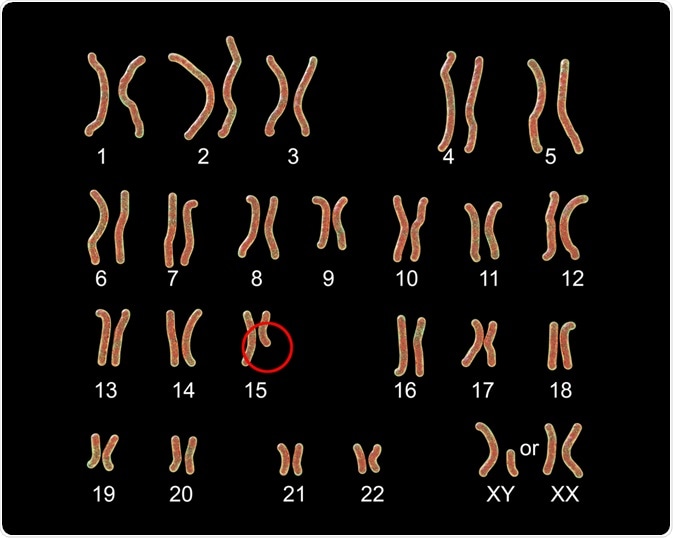Prader-Willi syndrome (PWS) is a rare disorder involving a sporadic genetic defect on chromosome 15, which can lead to developmental delays, behavioral problems and obesity. It affects one individual in 15,000 to 30,000 people, depending on the population group studied.
 Karyotype of Prader-Willi syndrome. Image Credit: Kateryna Kon / Shutterstock.com
Karyotype of Prader-Willi syndrome. Image Credit: Kateryna Kon / Shutterstock.com
Epidemiology of Prader-Willi Syndrome
Prader-Willi Syndrome typically occurs sporadically and cannot be prevented. Depending on the region of the world, the prevalence ranges from 1 in 8000 individuals to 1 in 52,000.
It affects both males and females of all ethnicities worldwide. However, some studies suggest the symptoms of the condition vary among different ethnicities.
PWS can lead to significant complications that lower the quality of life and may lead to potentially fatal situations in some cases. In particular, patients are more likely to become obese and have an increased risk of other health conditions as a result. This includes diabetes, sleep apnea, cor pulmonale and heart disease, which is the leading cause of death among most developed nations.
Symptoms and Diagnosis of Prader-Willi Syndrome
There are two distinct stages of Prader-Willi Syndrome:
- Hypotonia after birth, infant fatigue and failure to thrive. Developmental delays tend to cause young children to learn more slowly than other children. For example, the transition to solid food commonly occurs at a later date.
- Approximately a year after birth, the child becomes over-interested in food. This can lead to hyperphagia, hypogonadism, obesity, short stature and sleep apnea. Patients have elevated ghrelin levels, which increases hunger.
The diagnosis of PWS uses several techniques, such as DNA methylation analysis and fluorescent in situ hybridization (FISH), to differentiate the syndrome from other similar health conditions.
Additionally, testing glucose intolerance, insulin-like growth factor and thyroid function is recommended to eliminate other causes of symptoms. Dual-energy X-ray absorptiometry (DEXA) can also help by assessing fat mass.
Prader-Willi Syndrome: Osmosis Study Video
Treatment of Prader-Willi Syndrome
Children with Prader-Willi Syndrome usually require aid from a multidisciplinary healthcare team to provide optimal support. This may include advice from:
- Pediatric gastroenterologist
- Endocrinologist
- Psychologist
- Psychiatrist
- Dietician
- Occupational therapist
- Speech therapist
- Exercise advisor
- Orthopedic consultant
The behavioral difficulties throughout childhood can be difficult to manage and other family members are usually involved in preventing children from overeating and gaining excessive weight. They require less energy intake than other children and hyperphagia may lead to dangerous dilation of the stomach.
As children grow into adulthood, constant monitoring to check for the development of related complications is required. These may include cellulitis, diabetes, gastroparesis, hypothyroidism, edema, osteoporosis, scoliosis and sleep apnea.
There are several pharmacological options that may help a patient with Prader-Willi Syndrome:
- Growth hormone helps to maintain healthy growth and muscle development, also decreasing the risk of obesity and severity of behavioral difficulties.
- Olanzapine may help some individuals to modify behavior
- Haloperidol and fluoxetine are effective for some patients
- Selective serotonin reuptake inhibitors (SSRIs) such as citalopram may help to reduce irritability and stabilize behavior
However, no pharmacological treatment is universally successful and the treatment plan is usually tailored to the patient response. Medications that work by suppressing appetite, such as octreotide, do not appear to help reduce the over-eating behaviors associated with PWS.

Image Credit: koya979 / Shutterstock.com
References
Further Reading
Last Updated: Feb 3, 2021